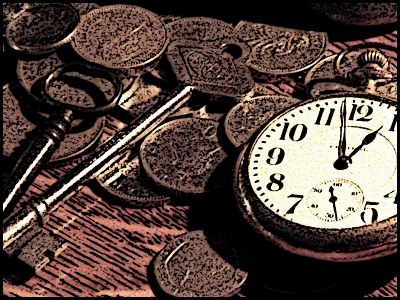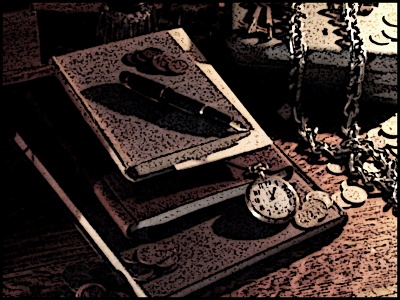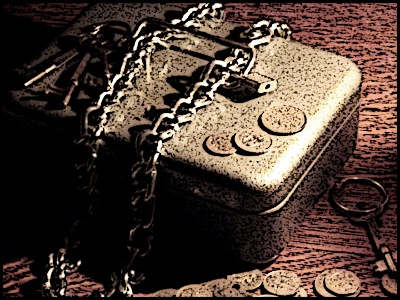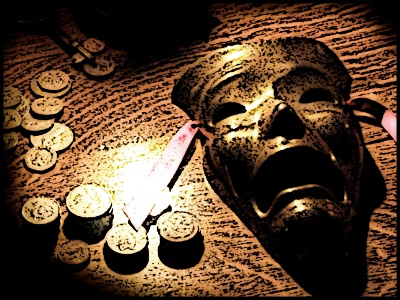
The jingling of the door-bell announced four arrivals: a blast of cold December wind; a spray of fine snowflakes borne upon it; the sound of horses clopping up the cobbled street; and two gentlemen. They were good portly fellows, pleasant to behold. The younger of the pair doffed his top hat and shook fresh snow from the brim as the elder consulted a list.
“Cratchit,” read the old gentleman. “Ware-housing, Pawn-brokering, Business Loans.” He looked up to find the sole occupant of the establishment seated behind a large wooden desk: a slight, sandy-haired young man of twenty-odd years with a genial expression. The gentleman adjusted his spectacles. “Have I the pleasure of addressing Mr. P. Cratchit?”
“P. Cratchit is my clerk, and is engaged elsewhere on business,” said the young man as he stood with some difficulty. Leaning on the desk, he clasped hands with each man in turn. “But I am also a Mr. Cratchit, being both his brother and the proprietor of this business. How may I serve you gentlemen?”
The younger, bearded man produced a leather-bound notebook and pen from inside his coat. “During this festive season, Mr. Cratchit, it is desirable that men of means like ourselves should make some slight provision for the Poor and Destitute, who suffer greatly at the present time.”
“Indeed,” said Cratchit, his smile fading slightly.
“Tens of thousands are in want of basic necessities, sir,” said the elder gentleman, setting his pocket-watch by the office clock. “Hundreds of thousands are in want of simple comforts. My colleague and I manage a fund which buys the Poor of this city some meat and drink and means of warmth.”
“I see,” said Cratchit, steadying himself as he propped a crutch under his right arm. “It is a shame that my uncle is not present; you would find in him a most agreeable benefactor.”
The two gentlemen exchanged glances. “May we inquire where this uncle might be found?” asked the younger of the pair, his pen paused above the notebook. “If you will pardon the impertinence of the question…”
“Oh, you needn’t beg my pardon,” said Cratchit brightly, maneuvering himself around the desk with the aid of his crutch. “We are all Men of Business here. Let me see… it is, what, six o’clock? On this day, at this hour, I would expect to find my uncle in a Camden Town cemetery not far from this office. He’ll be about six feet under a mean little stone bearing the name Scrooge. You may need to hunt a bit; I fancy the weeds have overgrown it by now.”
The younger gentleman closed his notebook.
Cratchit made his awkward way to a coat rack and proceeded to wrap a scarf around his thin frame. “My uncle—my father’s late employer, really, though I called him ‘uncle’ for a time—succumbed to a fatal madness some years ago. In fact he went mad fourteen years ago this very night.”

“Christmas Eve, sir?” said the elder gentleman. “Most unfortunate.”
“A singularly appropriate choice of words, sir; for un-fortune was the nature of his madness. He sought to divest himself of every pound and penny in his possession in the service of his Fellow Man. In a few short months the amassed wealth of decades had vanished like ghosts at cock’s crow.” Cratchit struggled into a long woolen coat, his crutch both aiding and hampering him. “At first my father and I reaped the benefit of his largess, as did many gentlemen like yourself. But what is good for Mankind is not always good for Business; and what is bad for Business is invariably bad for those Men who live or die by it.” He snagged a worn woolen cap onto his head, then gestured towards the door. The men, taking his meaning, preceded him into the street.
“You said the madness was fatal, sir?” asked the elder gentleman.
Cratchit withdrew a key ring from his coat. “My uncle’s new-found liberality turned his profitable business into a failed one. It was not long before creditors seized the property and put both him and my father out into the street. Having exhausted the funds of his estate in charitable ventures, my uncle lost his house and his few meager sticks of furniture, right down to the bedsheets, whereupon he learned that those who had survived solely on the virtue of his charity were of no help to him in his hour of need, as they were scarcely better off than himself. A broken man, he retired to a small cell in Bedlam, and eventually to an even smaller one under the stone that bears his name.” The lock secured, young Cratchit took one step with his crutch and immediately appeared to lose his purchase on a patch of ice. The elder gentleman caught him and helped him to his feet.
“Well, sir,” said the younger gentleman. “Our very reason for seeking you out is to ease the plight of those like your uncle, who have fallen into hard times. What shall I put you down for?”
“Nothing,” replied Cratchit, making sudden haste down an alley. “Good evening to you.”
His visitors chased after.
“It is not only men in want, but widows and young children too!” called out the younger gentleman.
“Surely, sir, a small sum—” began the elder gentleman.
Cratchit stopped abruptly to confront the pair. “Have neither of you understood a word I’ve said? I know full well the ills that grinding Poverty can bring, for I am the product of them! Credit this to my idiot father, who sought beyond reason to raise a large family on fifteen shillings a week, never seeking a better situation for himself, until his sole means of income vanished without warning. Now he is in a debtor’s prison and I must provide a house for my mother and unwed sisters, as well as employment for my equally-idiot brother who went and got a wife and mewling infants of his own! There is my provision for the Poor and Destitute; and would that I were quit of it, and all Family as well, now and forevermore!”

The younger gentleman’s eye fell to Cratchit’s crutch, which clearly pained him. “If not for the sake of the Indigent, sir, then what of the Infirm? For the Lord Himself did command us—”
Cratchit let out an ugly laugh.
“Look well at me, my fat friends: small of bone, crooked of limb, slave to a crutch in my twenty-first year. The hale, muscled men of Camden Town still call me ‘Tiny Tim,’ meaning no fondness by it. Women smirk openly at the phrase. Yet every week one or another comes to me with hat in hand, and then it’s ‘please, Mr. Cratchit, sir’ to be sure! What coin given of Charity can buy one-tenth the respect that Wealth and Power can? No, do not pity me my infirmities, gentlemen, for thanks to them I know who makes lame beggars walk and blind men see… Physicians, good sirs, who must be well paid by those with steady incomes.
“Mark this wisdom down, my fine fur-chinned fellow, and consider it of greater value than the entire sum of your ledger: if you would do the Poor any good, let them either pick themselves up or lie themselves down in the nearest grave. Charity is but a tax on the Sentimental, and Heavenly Rewards are a Humbug.”
With that, young Cratchit hobbled quickly down the alley until he was swallowed up by darkness.
The two gentlemen watched him until he was well out of sight.
“He stole your pocket-watch,” remarked the younger gentleman.
“Yes, when he pretended to fall against me,” said the elder.
“I saw his eyes follow the watch after you made such a show of winding and setting it. Large, gold, thin, no chain, dropped into the outside of a heavy coat. Far too tempting.”
“A poor excuse for picking a man’s pocket on the twenty-fourth of December.” The old man patted his great stomach. “Well, are you convinced?”
The younger man smiled and withdrew a letter that had been folded inside his little notebook. “It was the watch that sealed the deal, you know.” He signed the letter. “A pleasure doing business with you.”

The Old Gentleman entered the Camden Town graveyard just as the clock was striking seven: for on that day, at that hour, the place was thoroughly deserted. Scrooge’s stone was indeed covered by weeds, though of course he knew where to find it.
“Clear that off,” said the old gentleman into the emptiness.
Three shapes congealed from the shadows, pooling like fog around three sides of the stone. Grey tendrils pulled at the weeds, becoming fingers, then hands, then the arms of insubstantial figures. When the stone was clean they straightened up, thickening to a milky transparency.
“Any trouble?” asked the first Spirit, a small pale thing.
“It cost us a gold pocket-watch,” said the gentleman, whose own form grew blurry. “Or the idea of one, at any rate. I’ve deducted it from our mutual Expenses.”
“Hardly worth mentioning,” boomed the second Spirit, who towered over them.
“I wouldn’t want to be accused of short-changing my associates. Honora inter fures and all that,” sniffed the gentleman, who was now as pale as his companions. The bulk of his body seemed to slide off him, gathering in strange piles at his feet; his top hat melted and ran down both sides of his head. “Beside, a proper accounting is wanted.”
“Old habits die hard,” whispered the third Spirit from under her hood.
The gentleman drew the letter from his breast pocket. “Now then,” he said, “let us see what we have here.” Setting it down upon the stone, he unfolded it in a way that would not have made sense to mortal eyes, then unfolded it again, and again; with each pass of his hands the sides seemed to multiply like a house of cards assembling itself. “That should do it,” he said at last with satisfaction.
On the stone lay a half-dozen phantom coin-boxes, locked and girded with chains. Each of the three Spirits took one, while Jacob Marley (for there was no mistaking the old gentleman now: the pigtail, the waistcoat, even the funeral kerchief that bound his jaw shut) helped himself to the remainder. This was only fair, for it had been Marley’s plan from the beginning, fourteen years ago.
“I still say I should get more,” said the first Spirit, picking through the coins in his box. “I ferried the old bastard far and wide and did all that talking. He spent most of the time eating, and she didn’t talk at all.”
“Come, come; we all did our share,” said the second Spirit, clapping the first on the back. “Anyhow the terms of my contract were known to you at the start, the same in Death as they were in Life: I do not tread the boards unless a lunch is provided. Silver is good for afterwards, but while I am performing I must be fed.”
“What became of him?” whispered the third Spirit, pointing down at the stone.
Marley frowned. “I’ve no idea. Heaven, Hell, Somewhere Else. I can’t imagine his soul would have been worth much to anyone. In a world where murder, rape, and villainy scarcely widen the eye, what was Scrooge but just another miser? For that matter, what was his redemption but just another self-serving act?” Marley fell to his knees, clutching at the robe of the third Spirit. “‘Oh, tell me I may sponge away the writing on this stone!’” cried Marley, in perfect imitation of Scrooge.
The four of them laughed, long and loud.
Still chuckling, Marley traced the lines of the engraving with a ghostly finger. “Well, Ebenezer, I suppose you’ve figured out by now that the date may be amended but the name is indelible. In the eternal Hazard-match, your soul was but a penny wager. Now this,” he said, lifting one of the ponderous coin-boxes like a heavy child, “this is a proper reward for a long-term investment. Payment in full for the corruption of your sometime ‘nephew’... a child of sterling faith who would have died fit to join the highest choir of Angels, but for your well-timed meddling. Behold, Ebenezer—Infernal compensation for the Fall of one Pure Soul.”
Marley hung the box from his fetters proudly like the dozen others gathered about his feet. He was pleased with its heft. Mankind was his business, after all.
Version: 1.18
Words: 2137